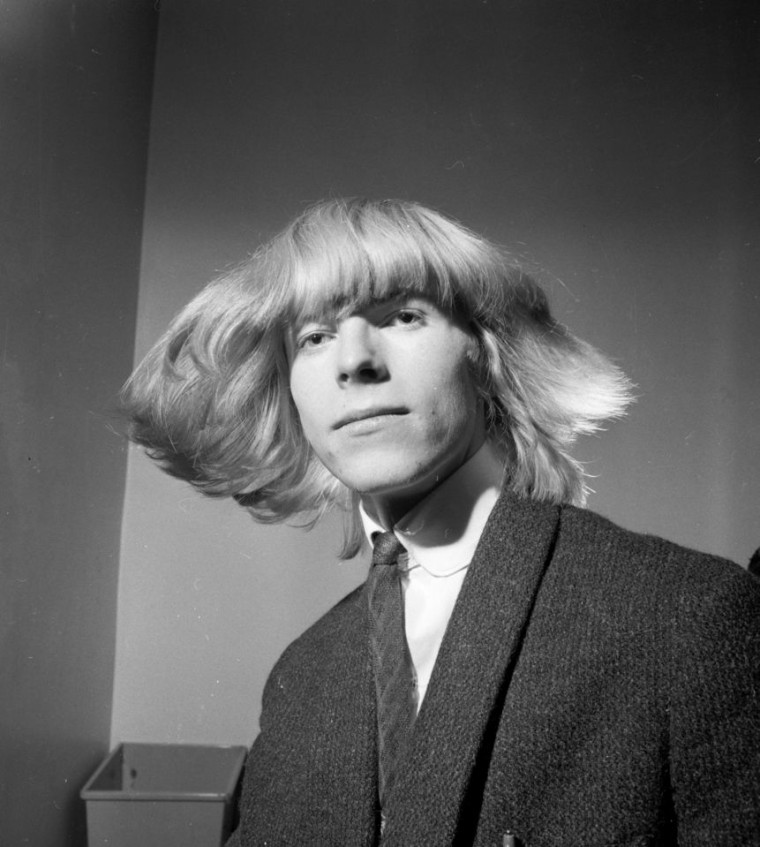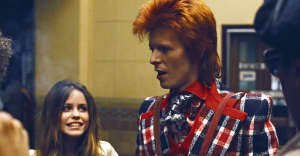David Bowie, bright light, died early Monday morning at 69 years old. The singer and actor, born David Robert Jones, has left so much of himself here.
The abundance of Bowie’s gifts to the world is borne of the proliferation of lives that he allowed to flourish in one body. His list of works, personae, and achievements is as unclassifiable as his eye color. Beginning in 1967, he released 27 studio albums—most recently, Blackstar, released January 8 of this year, on his birthday. Labyrinthine, he embodied "alien" in so many forms, most searingly as Ziggy Stardust, in conjunction with the 1972 record The Rise of Ziggy Stardust and the Spiders From Mars. David Bowie's spaceship knew which way to go, and that way was everywhere.
Even Bowie's most straightforward pop singles were bent up at their edges. Clad in glitter and his own splendor, he lent his astonishing voice and stylistic sensibility to manifold iconic tracks, serving himself to us on the galvanizing “Let’s Dance,” the limitless-feeling Freddie Mercury duet “Under Pressure,” and the downright joyous “Dancing In the Street.” In all things, he was unmistakably himself, which is to say, so many people: loving father to two, slender Martian, milk-drinking cocaine addict; beautiful changeling.
The inquiries Bowie made in in his music prompted generations to self-interrogate, individually and collectively. The androgyne allowed his gender and sexual orientations to fluctuate freely: Speaking to Playboy in 1973, Bowie, who had previously been married to a woman, declared, “I am a bisexual. But I can’t deny that I’ve used that fact very well. I suppose it’s the best thing that ever happened to me.” His identity continued to morph: In 1990, he met his second wife, the supermodel Iman Abdulmajid. Their marriage seemed lit with mutual delight and wonder throughout the rest of Bowie’s life—two people effulgent with modern love.
Bowie’s physicality and character, so striking in its singularity, was a call to action. His very presence demanded that the spotlight widen to include others within it, and he did so more directly, as well. In a 1983 MTV interview promoting “Let’s Dance,” Bowie asked the host, "Why are there practically no blacks on the network?" The host offers that certain Americans would be “scared to death by a string of...black faces, black music,” and tries to affix the blame to radio. Bowie hits harder: “Don’t say, ‘Well, it’s not me, it’s them.’” He refused to overlook the most basic, blatant fissures in social equality. He examined identity with loving precision—his, and others’—and, in doing so, he pointed out our existence.
David Bowie’s strength and appeal wasn’t that he was an alien. We loved Bowie because he seemed to more deeply explore and understand what it meant to be human than most, then relay those transmissions with incredible poise. He studied his heart, and ours, and surfaced his findings in his work. Who else could lend such grace to the Goblin King, whom he portrayed in 1986’s Labyrinth? Or sell us on the lofty, heart-inflating love and humanity of songs like “Heroes” and “Life on Mars?” just as impactfully as he shimmered through “Fame”? And look so fucking hot doing it—because he looked like no one else ever had? The character of David Bowie’s pride was present in all things; his lifelong companion.
Taking David Bowie’s lead means only to take each of our own. In respecting and allowing for his specific modes of being in the world, without capitulation, David Bowie granted outward permission to the rest of us by demonstrating that he had never required it himself in order to be radiant. Moving through life, he asked us all: In what ways are you radiant? It is necessary to keep looking for answers among one another, and to do so by presenting our own wholeness as proof that doing so is not only safe, but necessary, dazzling, world-alteringly radical.
It's up to us to heed David Bowie’s example. Let's continue to celebrate and be fortified by him by celebrating and being fortified by one another. Let's commit to transcendent human specificity, with Bowie as our lodestar. Let's dance.
 Potter / Express / Getty Images
Potter / Express / Getty Images


